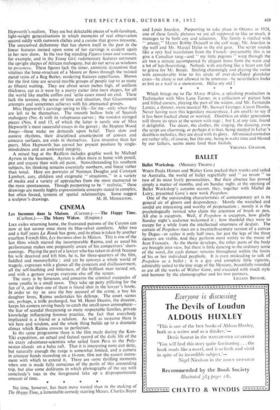CINEMA
Les Inconnus dans la Maison. (Curzon.) The Happy Time.
(Carlton.)—The Merry Widow. (Empire.)
LIKE exiles returning home, the frustrated patrons of the Curzon can now at last savour once more its blue-velvet comforts. After two and a half years La Ronde has gone, and its place is taken by another excellent French film, Les Inconnus dans la Maison. This is one of the last films which starred the incomparable Raimu, and as usual his performance makes one poignantly aware of his competitors' short- comings. Playing the part of a lawyer who has taken to drink because his wife deceived and left him, he is, for three-quarters of the film, fuddled and monosyllabic ; and yet he conveys a whole world of tragedy, expresses with a glance all the cynicism and disillusionment, all the self-loathing and bitterness, of the brilliant man turned sot, and with a gesture sweeps everyone else off' the screen. The story is by Simenon, and concerns the criminal escapades of some youths in a small town. They take up petty pilfering for the fun of it, and then one of them is found shot in the lawyer's house. In order to try to save the boy accused of the crime, a boy his daughter loves, Raimu undertakes his defence. The court scenes are, perhaps, a trifle prolonged, but M. Henri Decoin, the director, keeps his camera roving busily to catch the small-town atmosphere— the fear of scandal threatening so many respectable families, private knowledge influencing forensic practice, the fact that everybody implicated is a friend or a relation. As well as suspense there is wit here and wisdom, and the whole thing builds up to a dramatic climax which Raimu crowns to perfection.
In the same programme there is the film made during the Kon- Tiki expedition, an actual and factual record of the daily life of the six crazy adventurer-scientists who sailed from Peru to the Poly- nesian islands on a balsa raft. That it is interesting none can deny, but naturally enough the range is somewhat limited, and a camera in amateur hands recording on a 16-mm. film not the easiest instru- ment with which to extend it. There are some thrilling moments when one is made fully conscious of the perils of this astounding trip, but also some doldrums in which photographs of the sea with somebody's toes in the foreground take up a disproportionate amount of time.
* * * * No time, however, has been more wasted than in the making of The Happy Time, a lamentable comedy starring Messrs. Charles Boyer and Louis Jourdan. Purporting to take place in Ottawa in 1924, one of these family pictures we are all supposed to like so much, it manages to be both coy and salacious. The family is riddled with " amour," Master Bobby Driscoll in the calf stage, Mr. Jourdan in the wolf and Mr. Marcel Dalio in the old goat. The script sounds like a very bad translation from the French—presumably this is to give a Canadian tang—and " my little pigeons " wing through the air two a minute accompanied by elegant bows from the waist and a lot of hat-flourishing. Nobody with anything like a heart can fail to grieve for Mr. Boyer. Smiling charmingly and playing the violin with considerable brio to his circle of over-developed glandular cases—he alone is not allowed to be amorous—he nevertheless looks as lost as a waif in a snowstorm. Helas my old !
* * Which brings me to The Merry Widow, a splashing production in Technicolor with Miss Lana Turner, in a collection of picture hats and frilled corsets, playing the part of the widow, and Mr. Fernando Lamas, a thinner, more musical Mr. Stewart Granger, Count Danilo. Never having seen this legendary masterpiece, I am unable to say if it has been hacked about or worried. Doubtless an older generation will throw its spats at the screen with rage ; but I, at any rate, found it delightful. The decor, the clothes, the singing, the dancing, even the script are charming, or perhaps it is that, being steeped in Lchar's deathless melodies, they are dyed with its glory. All musical comedies are rather silly, of course, but this one, being in waltz time and blessed by our fathers, seems more fond than foolish.
VIRGINIA GRAHAM.


































 Previous page
Previous page